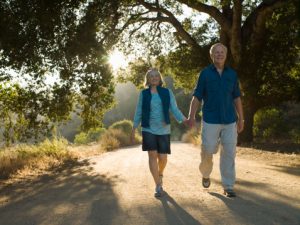
The research was conducted to find out how walking performance can be maintained even in old age. They observed that healthy elderly walk better than unhealthy ones.
Walking performance refers to a combination of factors – walking speed and the extent to which the human body uses energy to walk. In simpler terms, it is the distance one can walk per calorie, which reduces in old age.
In order to study this, researchers at Carnegie Mellon University made computer simulations of walking behaviors and human physiology.
They made a model of the structure of a musculoskeletal system and a neural controller, which controls the movement of muscles. Researchers then simulated ‘aging’ in the model by introducing changes in joint movement, distribution of body mass, and delays in neuraltransmission noise. These helped them observe that walking performance declines when muscle strength and mass reduce.
According to Seungmoon Song, the first author of the published research paper, this simulation could be developed further in the future to analyse how neurological problems caused by strokes and spinal cord injuries affect gait. This can be optimized to prescribe the best possible treatment.
This research shows that muscle strength and mass needs to be maintained or even built up if it is low.
How to build muscle mass in the elderly
Doctors today feel that it is never too late to start building muscle mass. An article by Jared Skye lists several measures for this. Skye explains how even senior citizens can build muscle. Just like everyone else, they need to practice healthy habits such as eating well and exercising.
The following guidelines can be followed in order to be strong and healthy, even in old age:
Dietary considerations:
- Consume more protein. Protein helps to build muscle.
- Drink sufficient water regularly. It helps to absorb nutrition and build muscle mass.
- Consume carbohydrates. Without carbohydrates, the body either burns muscles or uses proteins for energy, making one weaker.
- Balance carbohydrates with other essential dietary elements.
Exercise:
Elders need to approach exercise differently than younger people, as they have less muscle mass. Hence, it is best to consult with a physician before engaging in any exercise. However, the following recommendations can help.
- Always start with a warm-up. This can help to prevent injury and improve flexibility of muscles, enabling them to perform better while exercising.
- The main workout could be aerobics and muscle-strengthening exercises. Those who are capable of doing more exercise can try CrossFit-style body weight exercises.
- This should be followed by a cool-down that involves stretching. Stretching muscles ensures that they no longer remain tight from the workout.
What we learn from all this
The computer simulations conducted by researchers at Carnegie Mellon University prove that weakening of leg muscles affects the speed and efficiency of walking in old age. Therefore, it is important for people to continually maintain muscle mass by eating right and exercising. Following a protein-rich diet, consuming sufficient water, and not omitting carbohydrates is as essential as a regular exercise regime. This can be done even in old age, and can be started even if a person has been leading a sedentary lifestyle. Following these guidelines will not only help to maintain muscle strength, but also keep you active and healthy for a longer period of time.
Also read: 5 protein-packed foods to boost your muscle mass